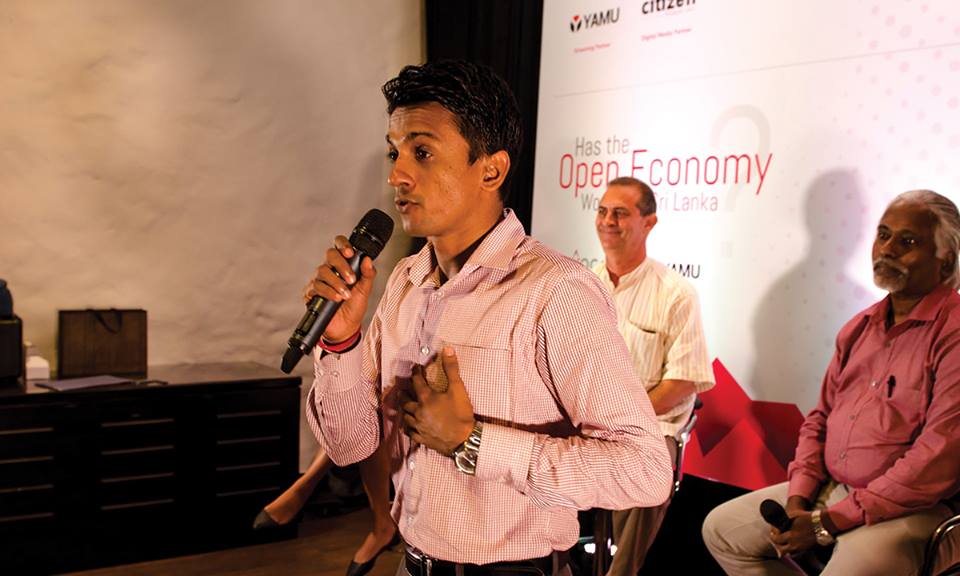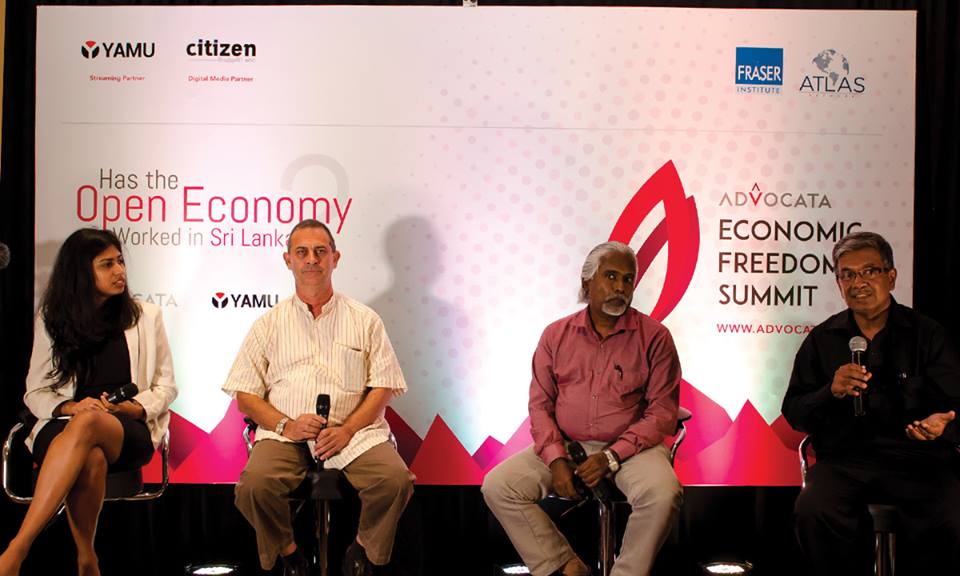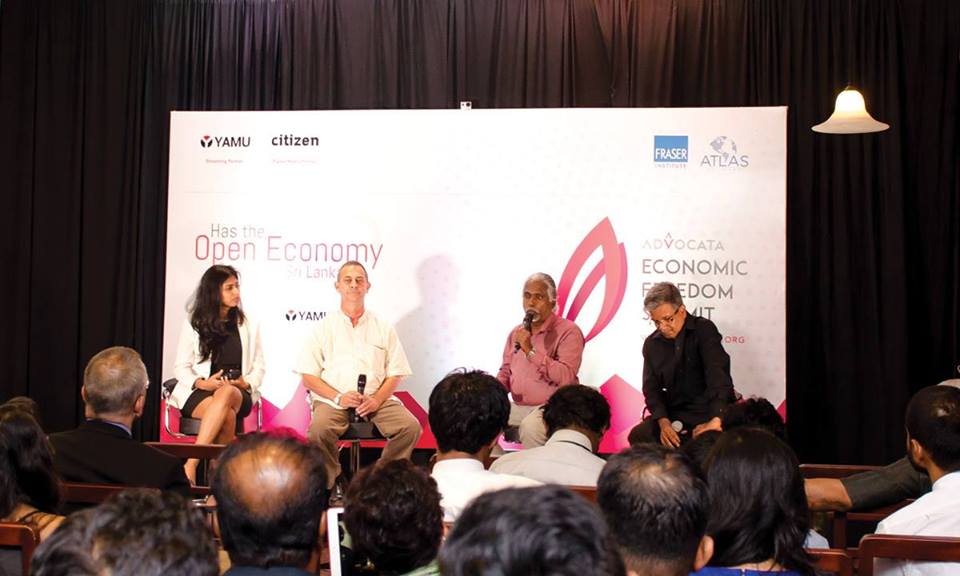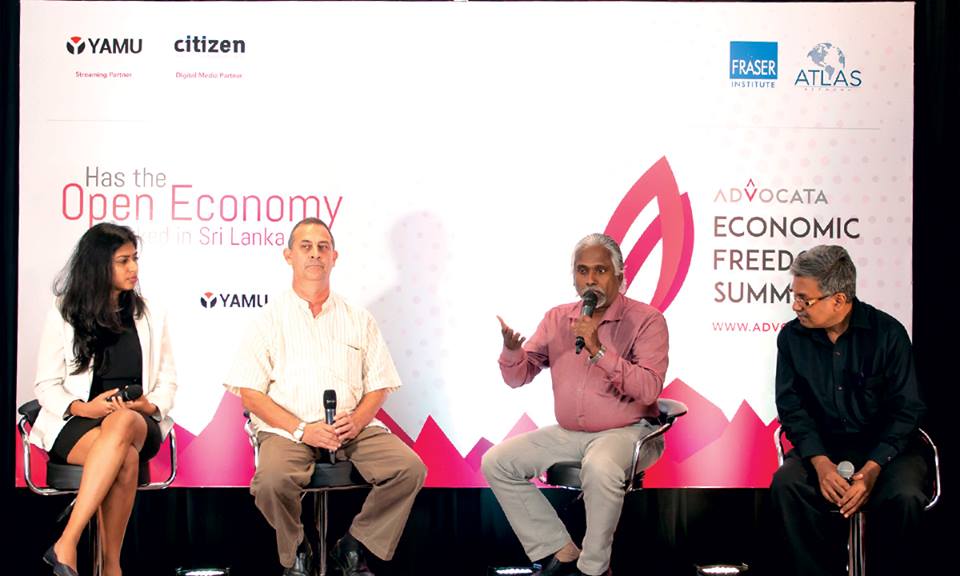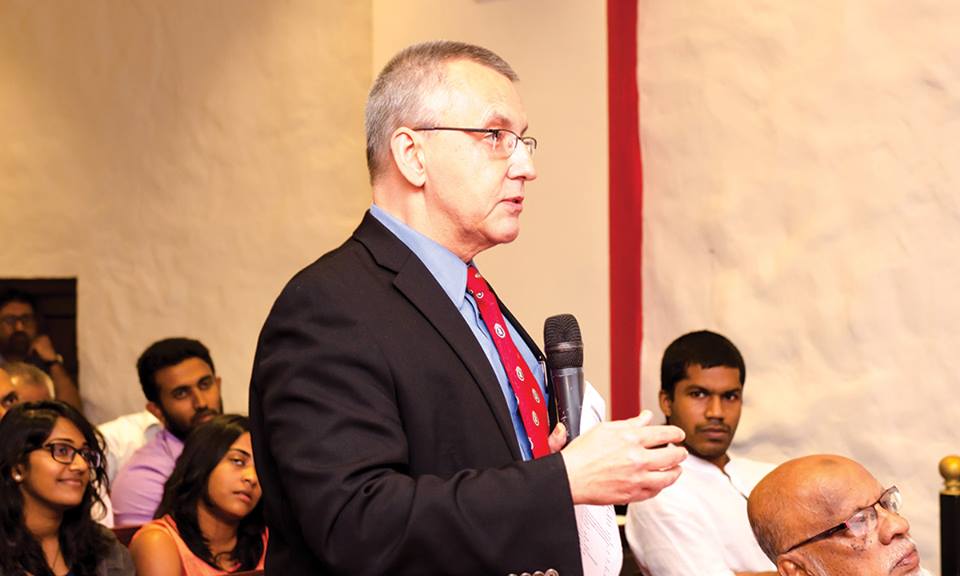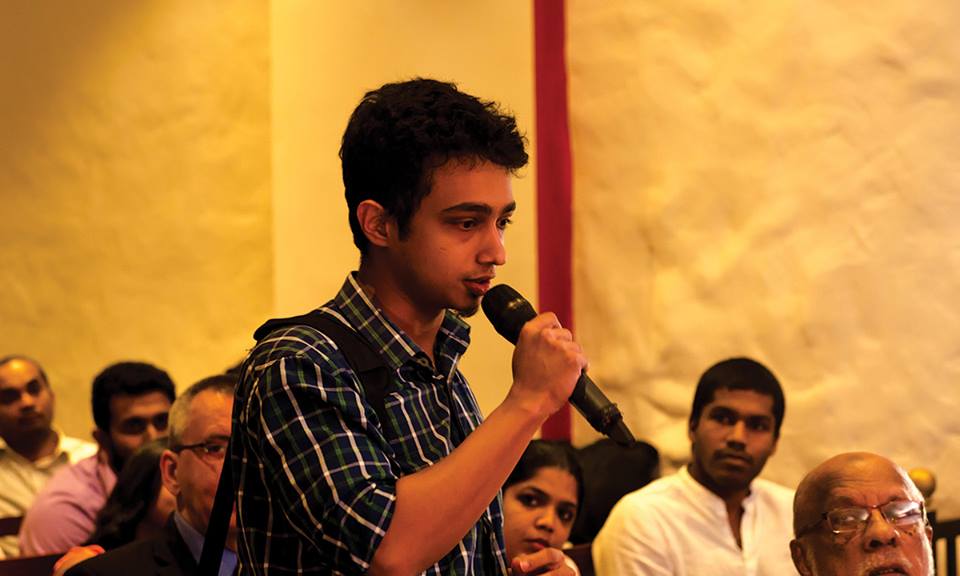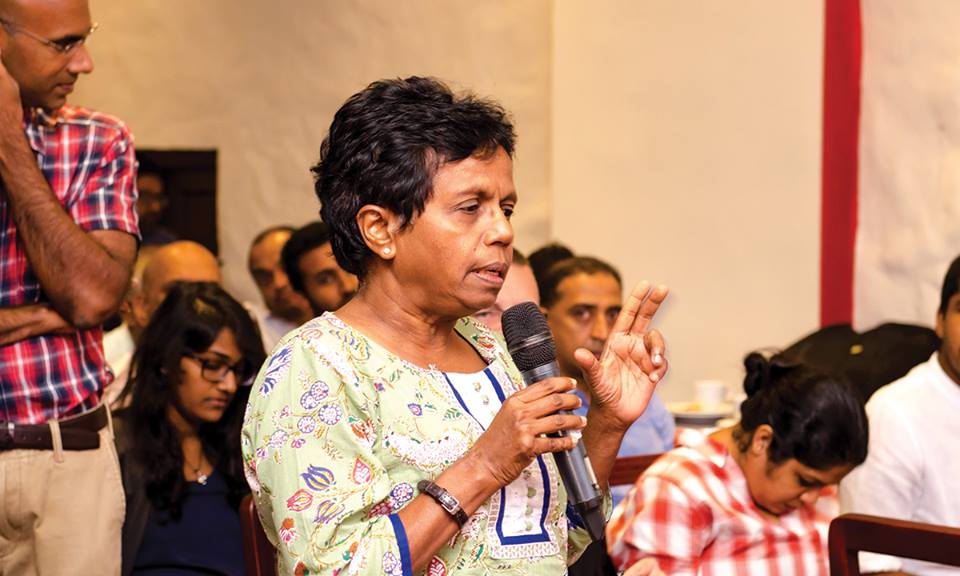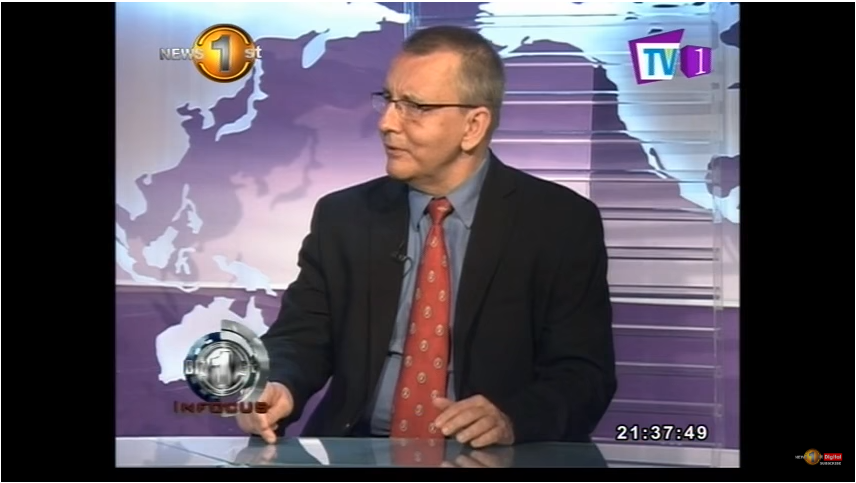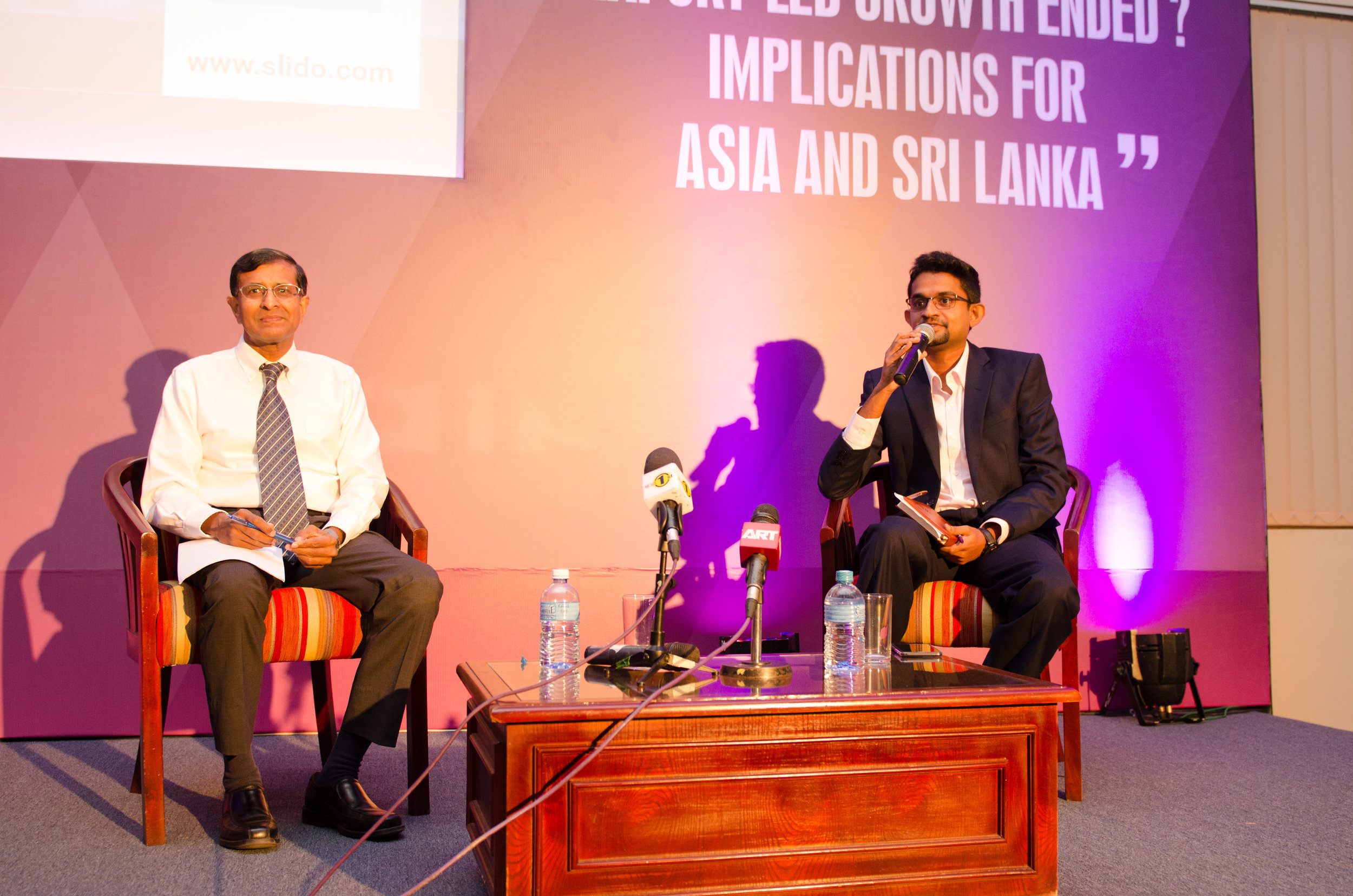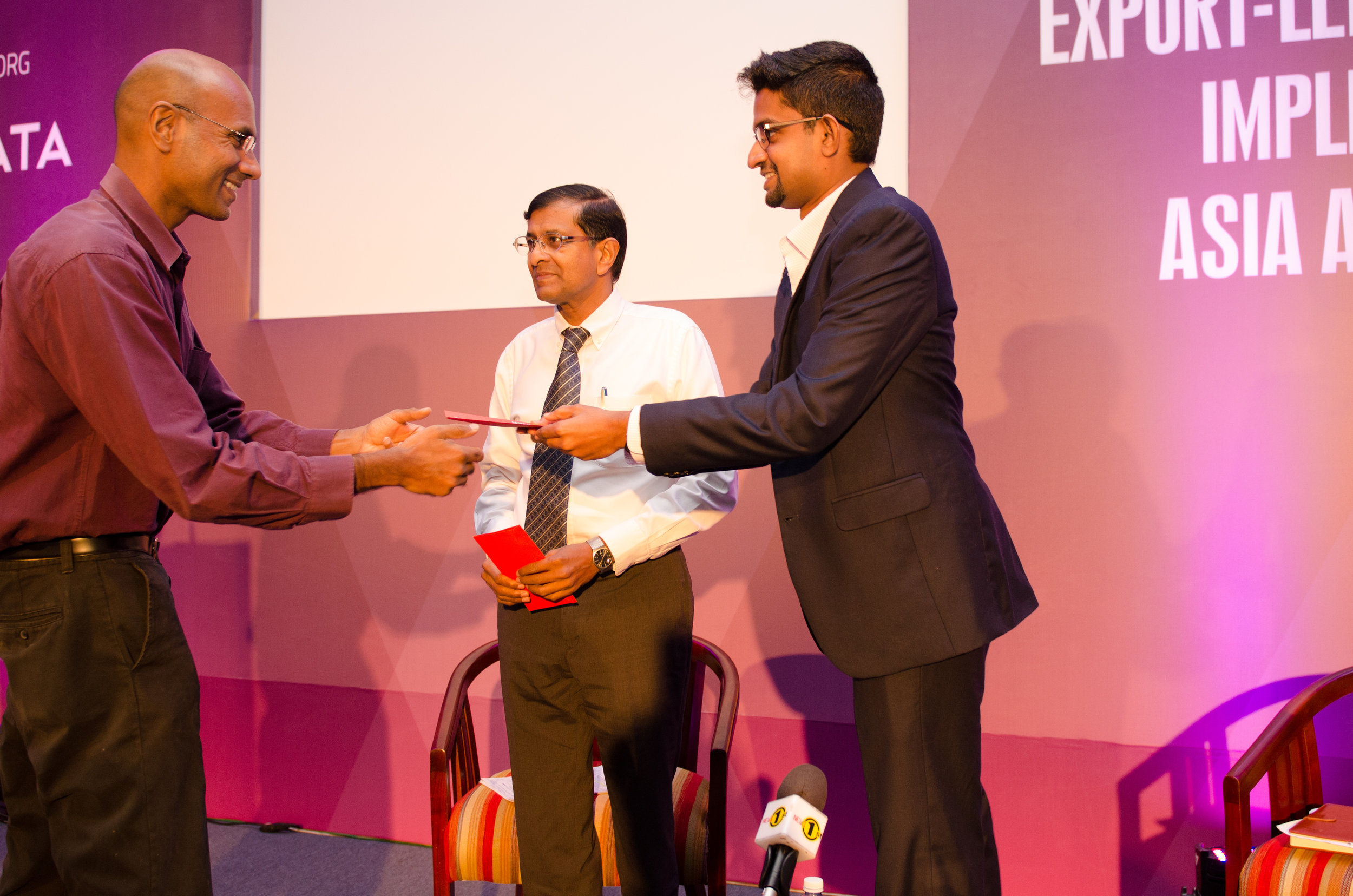I just want to make three points before I get into the hard content of my talk. The first is to reinforce the points that Advocata Institute COO Dhananath made about Advocata.
The time is definitely right for a Think Tank forum to promote limited government, free markets in a genuinely open society here in Sri Lanka. This combination has been very weakly represented. It is a set of beliefs that scattered individuals hold, but it’s time that they were represented collectively; and also to appeal to the young, the dynamic, the aspirational, not just here in Colombo but beyond, in the second tier cities, in the small towns and in particular, among those whose mother tongues are Sinhala and Tamil.
I would hope as Advocata grows, that it does things genuinely differently. There are far too many organizations, including think tanks here in Sri Lanka that are very hierarchical, very stuffy, very bureaucratic, very cautious and which seem to be unable and unwilling to communicate with the public out there in straight plain-talking language. So I’m counting on Advocata people to do things differently to be un- hierarchical, un- stuffy, un- bureaucratic, to speak in plainly and to show that collectively things can be done differently in Sri Lanka to appeal to the kind of audience that I mentioned before -- the young, dynamic and the aspirational.
The ideas that people have been faced with in the past have clearly not worked.
It begins with a romantic socialism which still attracts some thinking people. Sri Lanka has had its fair share of revolutionary utopias. They have been refuted by history. We now know the reality of how Russia and China really worked rather than the romantic visions of them going back a generation or two. There are still some people in Sri Lanka who eulogized Fidel Castro when he died just a couple of weeks ago. Well we know, it is documented, that Fidel Castro was a crook, a thug and a murderer on a not insignificant scale. Well he was a saint of course when compared to Stalin and Mao who between them and among them killed scores more than even Hitler. So we should say goodbye to those revolutionary utopians.
I have a quote here from the German poet Friedrich Holderlin who said, “What has always made the state a hell on earth has been precisely that man has tried to make it heaven” and we should not try to make heaven on earth because we may end up making a living hell out of it.
Sri Lanka is also seduced by communal socialism of the Tamil variety, and the Sinhala variety and they have torn this country apart. It has been seduced by the crony socialism of the SLFP and who has that benefited? The Bandaranayake’s, then the Rajapaksas and their bootlickers of course. Finally, not least not least Sri Lanka has been seduced by the crony capitalism of the UNP and who has that benefited? a Colombo oligarchy of course, but not nearly enough Sri Lankans outside that circle.
There is an alternative. Of a smaller, but effective government. Of free individuals and what Karl Popper called an Open Society. That’s what Advocata is there for.
A second note and this is just to express my own limits, and I hope this will be a note of humility. Some people dismiss me as this “SUDDHA” that flies in from time to time to quantify what is good and what is bad in Sri Lanka. It is true my Sinhala is very basic, I don’t’ speak any Tamil; I don’t live here, I haven’t lived here since the age of 12 or 13, I clearly don’t know the detail and nuance, of all of you, or nearly all of you in this room know and there are others that can do this talk better than I can. All I could do is say it as I see it; plainly, without holding back too many punches.
One of my great heroes is George Orwell. Orwell by the way, was a convinced democratic socialist and he denigrated capitalism. But, he was an incredibly clear writer and speaker. He spoke honestly. He wrote a very clear language, it was not a political language and there was nothing fake or stuffy about it. So, that is the least I can do in addressing the topic I have for today.
What I’m going to do is give a very big picture talk. It is a pre-90’s presentation --one of my favorites. in other words no PowerPoint, no slides at all so, then you are not looking over there [at the screen], you looking at me. It is a talk based on three scenarios for Sri Lanka’s future. Let me briefly introduce those scenarios.
The first one – Scenario one is of drift, which is a continuation of the present. The second on is what I call “Takeoff” that is the scenario that I hope all of us in this room want to see and what of course our politicians have promised us. The third scenario is “Relapse” – this is where we were before January 8th 2015.
So I would like to walk through my three scenarios and then come up with my conclusion but, let me give you my conclusion straight away. Another favorite writer of mine Morte said he likes a man to start with his conclusion.
My conclusion is that we are in scenario one, we are very far away from scenario two – “Takeoff” and we are dangerously closer to scenario three in other words – “Relapse”. Scenario one – Drift is a very unstable situation. Relapse is lurking around the corner and we really have to advance to scenario two – “Takeoff” because the alternative is relapse in other words the stakes are very high. I will elaborate in due course. Let me move to the first scenario – “Drift” the obvious place to start.
Where are we now? Let me give you my assessment for what it’s worth. Better than where we were a few years ago, but not by much and it should be much better than what it is now. What are the credits? Well the good news is that we have a bit more liberalism and democracy in Sri Lanka than we had under the Rajapaksa’s. People seem to have lost their fear for the moment. The media is freer and criticizes liberally. There is a 19th amendment in our constitution and there are restored independent commissions, public service appointments and there is a new constitution in the works. The ethnic temperature is lower than it was a couple of years ago and yes the right symbolic overtures that we’ve made to the minorities. The third good news is that foreign relationships have been balanced, so what was a very China-weighted foreign policy now has good relations for China but, restored relations with India and the West. All of that is good news.
What’s the bad news?
The bad news to begin with is of course that there is no “Yaha palanaya”. Good governance is back to where it was before the Rajapaksa’s. In other words back to mediocre governance and rife,corruption and nepotism. Of course what disappoints people most of all.
On the ethnic relations front the fundamental issues have not yet been dealt with; land restitution, regress for human rights abuses, demilitarization and not least of course genuine devaluation of power but, the politics are clearly daunting for any government which has its’ shoulder to a Sinhala – Buddhist hatland, that is understandable. What I think has really gone wrong is the economy, and that I think is crucial because, without getting that right everything else tends to fall apart. Let me concentrate on the economic situation and then extrapolate a little to the future.
It begins with really very bad macroeconomic policy, fiscal policy and monetary policy in the first instance. Now this is of course not new, it has always been the case almost since independence with governments spending far too much and with creating far too much money. There’s been too much public debt created, inflation, current account deficits and a weaker currency.
This government until recently at least, made it worse starting with fiscal policy. So, we had two very bad budgets in 2015. Price controls, exchange controls chopping and changing and all sorts of ad hoc taxes.
In other words the continuation of what was happening before. All of that led the government going with a begging bowl to the International Monetary Fund and new agreement with the fund and a new facility was negotiated. That has somewhat delivered better news and the situation has stabilized. The last budget in 2016 was not as disastrous as the previous two. If things go according to plan -- that is of course with a big “IF” Sri Lanka -- we might get closer to having a revenue closer to 15% of GDP as opposed to 10-11% of GDP.
It’s good news, but it’s limited because the government is still not serious about tax reforms. It’s about doing the minimum to satisfy IMF requirements and preventing a full blown crisis. It is not about serious tax or fiscal reform which I will get to later.
Monetary policy was also very bad, until a few months ago the central bank became far too politicized over a 10 year period. Interest rates were kept artificially low and there was too much money printing basically to support an unviable fiscal policy. And of course there were scandals. Particularly in the primary Bond market.
The only good appointment this government has made was the appointment of the central bank governor Indrajith Coomaraswamy. He is just the right man for the job, he has excellent credentials, he is clean and competent and he also has a very good temperament. I think in the last few months he has done his level best to restore integrity and credibility to the Central Bank. To focus monetary policy on clear objectives starting with price stability and to clean up its regulatory act and not least the regulation of the primary bond market.
I think all of those here and those outside this room who want to see Sri Lanka have genuinely good independent, competent public institutions should support the central bank governor. All the more important because there are governing politicians out there who seem to want to undermine him.
What about other areas of public policy? The good news is that starting with the Prime Minister, the diagnosis is much better than it was under the previous government.
The Sri Lankan economy has a competitiveness problem, it has a productivity problem. The way to raise productivity and competitiveness is to have a stronger private sector and also to have much more globalization for Sri Lanka. More trade, more exports and imports as well as more foreign investment. But, to do that policies need to change. The first set of policies that need changing would be what one would call “doing business” policies. As the business people in the room know there is a serious problem with getting approvals for various projects, going through multiple agencies, taking too long, corruption, the lack of technology, the lack of things that are online and these are simple reforms that have been done successfully abroad. The government has promised them here. It’s been promised in two prime ministerial economic statements but, so far after almost two years we have seen nothing. There begins the disappointment.
Let’s talk about trade. Sri Lanka has a much weaker game on trade and foreign investment. For a country like this, Sri Lanka has a shockingly low trade to GDP ratio, it’s 50% or less. Exports if you include services are about 20%. These numbers should be at least double. It’s got worse over the last fifteen years. The country receives a trickle of foreign investment, less than a billion dollars in 2016 and hardly any of it is for exports, its for local projects. The export basket remains static; tea, other plantation crops and garments but, it hasn’t diversified into other exports that east Asian countries have diversified into. Sri Lanka is not in the global value chains with the exception of garments, not in ICT, not in all sorts of services . To rectify that we need significant trade and investment liberalization. We are aware that the last government increased levels of protection significantly. Again the government in very vague terms have promised some of this but, we haven’t seen this so far after almost two years. Then there are the more difficult reforms, certainly more difficult politically like reforming state owned enterprises, land reforms, reforming labour markets, education and skills. Again, where nothing is being done. That is perhaps understandable because they are more tricky politically and might have to wait until after the next elections for the most part. But very little to nothing has be done even on the areas where it is less politically less difficult.
One key reason why these reforms are necessary is that Sri Lanka needs much more competition. Whether that competition comes from new players who are Sri Lankan or foreign players. It is really striking what little competition there is in the Sri Lankan economy wherever one looks. Most markets are tied up by little monopolies or oligopolies and the commanding heights are occupied by the Dhammika Perera’s and the Harry Jayawardene’s of this world with their political connections who are sitting on very comfortable rents and of course the last thing they want is competition; and there is collusion between these commanding heights and the political class. That is bad in all sorts of ways ; Sri Lanka needs ‘creative destruction’ as the economist Joseph Schumpeter put it, whether it comes from foreigners or locals. But, they are of course blocked at every turn. It's bad for efficiency in production and of course if you excuse my french -- it screws consumers.
All of this boils down to one fact ; there is still no economic plan for reforming the economy. It is good that Sri Lanka is getting advice from Professor Ricardo Hausmann and his colleagues from Harvard. It is good perhaps, that McKinsey has been hired to set up a delivery unit for reforms. But none of these are substitutes for homegrown basic plans of action and some basic priorities, one doesn’t need the ‘white man’ coming in from abroad for that. It is not rocket science, some of it I’ve outlined and these are not original ideas of mine either, they just need some basic mechanism of implementation.
I have one final worry and that’s about foreign relations. As I said the good news is that foreign relations have been balanced and we have much better relations with India and the west. It is also good that relations have been restored with China after that initial hostility after the presidential election. The Port City project makes sense. No one else is interested in Hambantota so, why not have the Chinese? even an exclusively Chinese industrial zone that covers all those Rajapaksa vanity projects including the port in Hambantota and relieve the government's debt burden in the process.
But, this is what worries me. Sri Lanka is now drifting back to Chinese influence but, without the appropriate countervailing balance of productive private sector investment from the West and India. That investment would be far more productive than what we would get from Chinese state owned companies. The imbalance to what we have been drifting back in the last year in relying again almost exclusively from China for large scale foreign investment, is both a worry in the economic front and the security front. It’s a worry on the economic front because, the Chinese practice a different kind of capitalism -- at least the Chinese state capitalism. Chinese private sector capitalism is extremely entrepreneurial. But the type of Chinese capitalism we have in Sri Lanka is the capitalism of the Chinese communist party state, and it’s proxies. I’m not against that in principle, as long as it's balanced by other healthier investment from the West and India. But we should know what kind of rules this Capitalism plays by. And there is evidence of how it is being played out in East-Asia -- It is about buying up political business elites. Do we really want to see that happen? It’s already happening. I would urge the media and independent reserves to scrutinize these projects including the port city project. It has security concern as well because, we need to have relationships all around. Including the relationships with Americans, Europeans and the Indians. The last thing we need is another PLA submarine slipping into a Sri Lankan port. Lets not forget the Chinese are playing the long game here, not just for commercial advantage but, for other reasons as well. We should have no illusions about that.
Now let me ask the question why has little changed in our economics and in politics?
Let me point out three factors that occurred to me. The first one is complacency, this is really a curse in Sri Lanka. Unfortunately Sri Lanka is blessed with a natural bounty in the wet zone and with the Sinhala Buddhist culture that dovetails with that natural bounty. It’s all in Robert Knox who wrote the best book written by any “SUDDHA” about Sri Lanka about four centuries ago. There is definitely lacking here a culture of work, of striving, of self-improvement, of responsibility. There’s too much of a culture of expecting coconuts to just fall into one’s lap and the feeling that the rest of the world owes Sri Lanka a living. What that brings -- particularly among Sri Lanka’s elite -- is an introversion and parochialism. There’s saying of Argentines, that Argentinians loved to compare themselves with themselves. To be frank that reminds me a lot of Sri Lankans who love to compare themselves with themselves, but not with better practice outside and how it can be adapted here for the benefit of all Sri Lankans.
My second observation of the root cause is about the political class. What was striking was that even though the government has changed, the political class hasn’t. Musical chairs are being played within the political class. It’s not just the case of the wrong thinking and the wrong words and actions but, the serious vested interests of incumbents who of course don’t want the younger generation to break through and do things differently. This threatens their interests and it threatens the interest of the business cronies. It’s not just a problem with the political class but with commanding heights of business as well. I’ve come around to the conclusion that nothing fundamental is going to change unless we see a breakthrough of a younger and better generation in both politics and business.
Let me single out a quote. This is from a British journalist who visited Ceylon in the early 50’s his name is Harry Hopkins, he said this about the Burmese political class, but it applies here, and I quote “A taste for melodramatics, the juvenile striking of poses, the individualism that turns to dacoity or political privateering, the oversensitive national pride that becomes first a morbid resentment of all criticism, then xenophobia... It all added up rather disastrously to a tendency to anarchism, to a preference of the florid gesture to the dreary but effective business of getting down to the job.” That reminds you of some people here no doubt.
Now let me project all of this into the future. This scenario of drift, what does it look like? Well it looks like what is said of Brazil. You know what is said of Brazil? “Brazil is the country of the future. Always was and always will be”. There’s that golden potential out there but, it’s never achieved because Sri Lanka keeps, as my friend Thissa Jayatilaka puts it – Missing busses; or Sri Lanka never misses an opportunity to miss an opportunity. I hope that opportunity has not been squandered. It's’ late in the day but, that window is still there. If it isn’t then we will see this continuous drift. In other words ossified political and business elite, mal-governance, ethnic tensions, a creeping drift towards overweening Chinese influence and economic stagnation.
But let me try and make that less abstract. What economic drift and not achieving that potential means that outside a narrow elite, ordinary Sri Lankans will be deprived of opportunities of livelihood and life chances that they deserve. What that means is that an under developed under class that [audience member] Elmo Jayawardena and his wife and happy band of brothers and sisters cater to. People who live hand to mouth across the country and much bigger class of Sri Lankan’s who are perhaps not in dire straits, but who are underdeveloped in every sense : uneducated, unskilled, underpaid, under productive, under worked, all of which translates into the driver of a three wheeler looking for scraps of work whose son also becomes a three wheel driver or a maid who goes to the gulf, who sometimes gets treated barbarically, sends money back to a good for nothing husband usually whose daughter becomes a maid and ends up doing the same thing. Is this going to continue into the indefinite future? That’s my scenario two.
Scenario two, to be optimistic, is the take-off scenario. Let me run you through that. It’s about Sri Lanka taking advantage of every external opportunity to achieve its long term potential. What would that look like? Well it would look like a growth rate of about 6-8% as opposed to 4-5%. A growth rate enough to increase Real Income that would translate into tangible benefits not just for a narrow elite but, for a broad majority across the island and across the ethnicities as well. It would need to be driven by a private sector engine and a foreign engine as well, in other words a private sector investment and globalization. On the globalization front what it would look like in numbers terms is over however many years trade rising to above 100% of GDP which is what this similarly populated East Asian countries have. In fact well above. In Malaysia and Taiwan it’s a 150-200% which have populations are roughly similar to Sri Lanka’s. Vietnam with a population of almost a 100 million has a trade GDP ratio of about a 150%. It would look like an export basket that diversifies way beyond garments and plantation crops, which are going to be increasingly under pressure from low-cost countries. Into more manufacturing niches, above all service sectors perhaps starting with shipping and logistics. It would look like more foreign investment. $3 to $5 billion dollars a year. Not less than a billion. And some foreign investment that’s meant for production for exports, not just condos and other little local things that are generally less productive. But all of that is not going to happen without a series of reforms.
Let me elaborate on what I spoke in Scenario one, of policy the reforms. It begins with the maxim “first do no harm” In other words simpler and more predictable policy. No more changing of taxes, no more price controls, no more announcements of exchange controls and so on. Secondly it needs a stable macro policy at long last that goes beyond with the IMF program. In other words serious tax reform where Sri Lanka moves towards taxes that are genuinely simpler, relatively low over corporate and income tax with few exemptions. If the yardstick is simplicity, then the revenue will come on. As it has done in many other countries. The best examples are of course places like Singapore, Dubai, Georgia and Estonia.
On the monetary policy side it needs price stability and a genuinely independent central bank. It needs a market exchange rate which will probably depreciate further given the external conditions increasingly so with the probable further rise of the U.S interest rates and the appreciation of the dollar. Thirdly it needs those doing business reforms that have been promised for the last two years. Much more stuff online, much less discretion for the bureaucrat, fewer agencies, shorter deadlines and automatic procedures. Mr. Modi has done this in India, not very comprehensively, but quite a lot in such a complicated state. This is really a matter of political will and leadership. With the right will and with a few competent people in charge this is the sort of thing that can be done. Especially in a small country.. it’s less complicated or should be less complicated than it is like in a large diverse country like India. There’s a lot of legislation from the early independence years that needs to be got rid of not least for small scale entrepreneurs.
Trade reforms need to happen. We need the removal of a lot of additional tariffs and of course we need a big simplification and reduction of the nominal tariffs on imports. Get rid of export controls. We need a genuine one stop shop for foreign investments. We need much better trade facilitation so that customs actually does work, like it does in some east Asian countries; technology is very much part of the answer.
There are also structural reforms that I talked about earlier that are politically more difficult, SOEs, labour market reforms, etc. It’s not just a matter of reforming policies but, it’s also a matter of reforming institutions. It’s difficult to see these policies change with certain people in charge of these policies. In other words we need better personnel at cabinet level and below. We need fewer ministries and a smaller cabinet. We need civil service down reforms as well. Ideally a smaller, but better targeted, better trained civil service. These are medium to long-term fixes, not short-term fixes. Sri Lanka needs more institutional checks on the discretion of politicians and bureaucrats. Other countries have it, there are some set clauses on legislation on regulations. There’s less discretion in some countries for head of government or cabinet to simply issue decrees without going through Parliament. Other countries have more rigorous judicial review. We need more modern cost-benefit analysis of regulation. All of these things, Sri Lanka doesn’t have.
There is one aspect of policy reforms that I want to talk about, and that’s decentralization. This is a very centralized polity. Everything emanates from, leads back to the Colombo political elite and its allied business elite. Whichever party happens to be in power. One thing that I learned from doing some work on cities for the World Economic Forum is that the successful reforms around the world are not actually done by international organizations. Far from it. Not in Brussels by the European institutions at supranational level. Not even in national capitals. The most successful reforms are done in the small regions and cities which are closer to the citizen where you can experiment more, where you can be pragmatic, where you can learn better practice from other cities and other regions. Where a mayor can fancy him or herself as a CEO. I can give you many examples of cities, these cities expand and spread bottom up. The best example is from China. The success of China is not down to omniscience and competence of the Chinese communist party --that’s of course the narrative they would like you to believe. It's’ about Deng Xiaoping choosing a small fishing village called Shenzhen in the south of China far away from Beijing politics and allowing a reform experiment to happen there. The first Special Economic Zone. Which was first successful and was copied all over China because of its success. Some of those reforms were then rolled out nationwide. Shenzhen is now a city of more than 11 million people, 4 million people more than Hong-Kong.
So what’s the lesson there for Sri Lanka? Its that we need more decentralized politics and with it more decentralized business. I’m not talking in the first instance of dysfunctional provincial councils. I'm talking about devolving power, real powers for taxation, expenditure to municipal authorities and mayors. New rules of governance for these decentralized units to allow these experiments to happen because they will happen there more than they will happen in Colombo and at the national level. This is an issue for the megapolis. All the talk about the megapolis have been about engineering fixes. It's about urban development in the natural sense. No one talks about the governance of the megapolis. What are going to be the rules of the megapolis? Because, if the rules are not going to change. The megapolis will fail for all the political reasons. It needs a different kind of executive authority with devolved powers which will also allow a new elite to emerge a different channel from Colombo as it were. A new political elite and a new business elite. Political decentralization is vital.
So much for the economic contours of this second scenario. What does it mean for things that are beyond economics? Well ethnic relations to begin with. Very basic point here. If the economic pie is static, it means more political conflict and more distributional conflicts. That’s a lesson of history. If a country is not growing economically to satisfy the aspirations of the people, people will fight more over slices of the pie or cake. In Sri Lanka that translates into racial, religious and ethnic fights. If the pie is growing -- 6-8% growth rather than 4-5% -- it means that there’s more to share around. Of course ethnic relations are much more complicated than this, but the precondition is for a sustainably growing economy. To ease the passage to genuine ethnic relations.
Similarly for foreign relations: a country that’s growing at 6-8% means that the country has investment coming in from the better businesses in India not the third or fourth division dodgy businesses who wants to do special deals. It means big-ticket investment from Europe, U.S , Japan and elsewhere. That means genuinely balanced relations.
The summary of scenario two is that of a prosperous and cosmopolitan society. That means a Sri Lankan Sri Lanka not just a Sinhala-Buddhist Sri Lanka and open to the east and the west as well as to our big neighbor up north. The bad news is that this is still far away. For all the talk, it is not around the corner, it is not going to take off immediately because the hard work has not been done. And without that happening it is not going to be like the proverbial coconut falling into a Sri Lankan lap. That’s the bad news. But the prize is still very much there to be had. The window is still open but, narrow because two years have lapsed in the process.
Let me move on to the third and most worrying scenario -- relapse. This a Rajapaksa-like scenario with echoes of Mr. Premadasa and J.R Jayawardene and Mr. & Mrs. Bandaranaike.What is it? Let’s start with politics. It’s a relapse into a ‘big man’ authoritarian politics rather like Vladamir Putin’s Russia.
So a charismatic big man comes along taking advantage of social discontent, wins the presidential election and comes in to ‘clean house’. Which means neutering opponents, individuals as well as institutions. It means someone who rides at the head of the movement rather than a political party and a movement that co-opts individuals into the tent through carrots and sticks. So we return to a illiberal democracy.
It means secondly, back to a statist economy where the state has a bigger direct role in the public sector and a very indirect role in shaping the private sector as well as the military in the economy. It means allowing foreigners much more selectively through very specific channels provided they cut the right deals with the right people and the right clan. And that would be a recipe for stagnation. It would be dressed up in the revolutionary socialist rhetoric of the past of course. And there will be plenty of fellow travellers to justify it in the opinion pages of newspapers and online.
Ethnic relations is perhaps going to be a worry in this scenario. This big man is invariably going to be a Sinhala Buddhist riding at the head of a Sinhala Buddhist movement. This is of course the long strand in SL history. I hope I don’t get firebombed for saying that it began with Angarika Dharmapala. It has reared it’s ugly head since independence. It particularly reared its ugly head under the Rajapaksas. It strikes a chord with some in the Sinhala Buddhist heartland and the sangha. The narrative here would be that Sri Lanka has been sold to the minorities and that Sinhala Buddhism has been sold down the mahaweli as it were. What I have noticed from my travels around Sri Lanka is the reaction of the minorities to this is rather like the Hedgehog; who put up defense mechanisms and retreat into your own shell. True particularly of the Jaffna Tamils. I see it from the community that I come from, the Muslim community here, that has put a strain on Islamic fundamentalism that wasn’t there when I grew up but, is definitely there now. It’s a kind of mimicking of what they see with Sinhala – Buddhism. That’s a recipe for a Sri Lanka of multiple solitudes, to borrow a Canadian term, as well as a recipe for more ethnic tension as well as violence.
The final feature of this relapse scenario is a that of acceleration to back to preponderance of Chinese Influence. Of Chinese state capitalism, the buying up of in a much more comprehensive way, political and business elites of Sri Lanka with security implications as well.
There are those in Colombo circles who may dismiss what I say as fanciful. Who will argue that we’ve made a fundamental shift since 8th January 2015, that we are not going back to all that.
I would be very naive or stupid to think this scenario not a possibility. I’m not saying it’s going to happen, it’s not pre-programmed. It’s a plausible scenario. With rising social discontent particularly outside Colombo, I think this scenario becomes plausible by the day. So I would take it very seriously.
We have to ask ourselves some very hard, direct questions. One is this: Sinhala society is very hierarchical. There is historically been a yearning for the “big man” in sinhala society, a dutugamunu character. The political conditions may be right for someone who pretends to be that kind of man. Sinhala habits of the heart as it were. It’s not that long ago that Sinhala mobs not only burnt Tamil shops but also Tamil people. And disgustingly mutilated other Sinhalese in coastal roads and the hill country. It is not that long ago that atrocities equally, if not more worse were committed by the LTTE and other Tamil terrorist groups. Is that really behind us? I’m not that persuaded. I would like to say that it is. But I think Sri Lanka’s foundations are too brittle.
Let me now come to my conclusion. The first scenario of drift, one that’s like the present, not a very good scenario at all. The scenario two of the take-off. The third scenario of relapse. My punch line is this – I don’t think this present scenario extrapolating from the present is a stable one. I don’t think that we can be assured that we can continue to drift. If we don’t make judicious moves toward scenario two we are going to go back into a scenario three of relapse.
The stakes are very high and moving toward a scenario of genuine renewal starting with an economic take off. It’s beyond the usual economist-talk of policy reforms or structural reforms. It is also about an injection of fresh blood into Sri Lanka’s political and business elite without that things are not going to change fundamentally. This is perhaps the most difficult question of all. It is not in the interest of incumbents to change things fundamentally. So how does one bring about a fundamental breakthrough for the young, the dynamic, the aspirational who have a different vision for Sri Lanka. We need to put our thinking cap on find the avenues.
Thank you.

